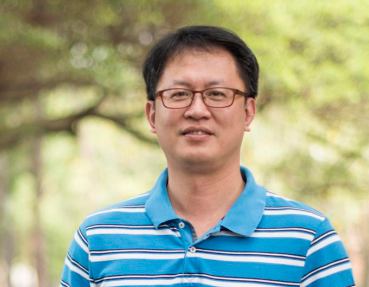About the Project
A Conversation Quest for English learners to practice their speaking skill is introduced. The system is designed specifically for assisting English learners to cultivate their speaking proficiency. Providing a non-threatening environment with goal-oriented tasks, learners are invited to join a game with scaffold speaking tasks.
Based on Vygotsky's socio-cultural theory, social interaction is a key element for improving language acquisition and speech fluency. It is believed that English learners would improve their communicating skills of using the target language while interacting with native English speakers because they can provide support or authentic language usage examples for learners through scaffolding structures like modeling, repetition, or linguistic simplification.
In reality, however, a native English speaker may not be available for all English learners, so the Conversation Quest is designed and developed to provide learners with simulated conversation scenarios. These simulations aim to replicate real-life interactions, offering consistent practice opportunities that help build learners' confidence, fluency, and communicative competence over time.
Videos
About Us

Dr. Maiga Chang
Supervisor
Dr. Maiga Chang is a Full Professor in the school of Computing and Information Systems at Athabasca University, Canada

Dr. Cheng-Ting Chen
Collaborator
Dr. Maiga Chang is a Full Professor in the Department of Applied Linguistics and Language Studies at Chung Yuan Christian University, Taiwan

Dr. Kuo-Chen Li
Collaborator
Dr. Kuo-Chen Li is a Full Professor in the Department of Information Management at Chung Yuan Christian University, Taiwan

Our Goal
Supervisor
A generative AI-powered platform offering personalized guidance to support parents in every stage of their child’s development.
Our Team


Pei-Shan Yu
2018
Sandy is a software developer from Chung Yuan Christian University in the department of Information Management. Since graduation, she has been committed to the field of software development,
Publications
-
Maiga Chang. (2023). MEGA World – A Platform of Multiplayer Educational Game for All. In: 31st International Conference on Computers in Education, (ICCE 2023), Matsue, Shimane, Japan, December 4-8, 2023, Volume 2.
-
Kuo-Chen Li, Maiga Chang, and Kuan-Hsing Wu. (2020). Developing a Task-based Dialogue System for Language Learning. Education Sciences, 10(11), Article #306.
-
Maiga Chang, Cheng-Ting Chen, Kuan-Hsing Wu, and Pei-Shan Yu. (2019). Conversation Quest in MEGA World (Multiplayer Educational Game for All). In Proceedings of International Conference on Smart Learning Environments (ICSLE 2019), Denton, TX, USA, March 18-20, 2019, 77-82.
-
Cheng-Ting Chen, Maiga Chang, Kuan-Hsing Wu, and Pei-Shan Yu. (2018). Web-based Conversation Quest for Enhancing English Speaking Skills. In the Workshop Proceedings of the 26th International Conference on Computers in Education, Manila, Philippines, November 26-30, 2018.
Frequenty Asked Questions
-
What is the main purpose of MEGA World?
MEGA World is designed to help students learn course content through interest-driven exploration and stealth assessment in a multiplayer game environment. It allows teachers to build their own virtual worlds and quests for educational engagement.
-
Can MEGA World replace traditional exams?
Most users supported using MEGA World as an alternative to traditional supervised exams, citing reduced stress and increased engagement. According to feedback collected from seven participating students in the Java Programming course, several students felt that the game-like format helped them better assess their programming knowledge in a more interactive and enjoyable way compared to standard exams. Some students mentioned that the platform’s structure, which includes completing quests and solving problems across different levels, encouraged continuous learning rather than last-minute cramming.
However, while students appreciated the freedom and self-paced nature of MEGA World, some expressed concerns about the lack of standardized control and oversight. As a result, they recommended incorporating some form of supervision—such as time limits, logged activity tracking, or invigilation during critical assessments—to maintain academic integrity. -
I do not have access to mobile data. Can I use this application?
Our App has offline functionality. Whenever the device is connected to Wireless network, it can download POI(Point of Interest) data and synchronize all data to the server.
-
Why Use a planned out Conversation Tree Instead of a Full AI API in MEGA World?
MEGA World uses a structured conversation tree rather than relying solely on a generative AI API because a conversation tree provides predictability, topic control, and consistency—all of which are critical in educational settings. While AI models like ChatGPT can generate fluid, natural responses, they are prone to hallucinations, where the AI generates inaccurate or off-topic replies that may confuse or mislead students.
In contrast, a conversation tree ensures that interactions between students and NPCs follow a predefined learning path designed by teachers. This structure guarantees that each dialogue branch reinforces specific language learning objectives and aligns with the intended lesson outcomes. Teachers can control the difficulty, tone, and appropriateness of each response, making the conversation safe, relevant, and pedagogically sound. -
Why is role-playing an effective method for language learning and skill development?
Role-playing in MEGA World helps students practice language by placing them in lifelike scenarios where they must respond naturally during quests. This interactive approach improves fluency because students aren't just memorizing—they’re using language to solve problems, complete tasks, and communicate with characters in context.
It also strengthens skills like decision-making and collaboration, especially in speaking and conversation quests. As students explore the game and interact with NPCs, they become more confident in their responses and are encouraged to think critically, all while progressing through quests that match their language level. -
Who can create quests in MEGA World?
In MEGA World, only teachers can create quests using the Management Portal, where they have access to tools like the map editor and quest editor. These tools allow teachers to design customized learning and assessment activities that align with their course objectives and structure quests by type, level, and subject area.
However, teachers can involve students in co-design informally—such as by gathering student input or ideas for quests, or assigning students to draft quest content as part of a class activity, which the teacher then implements. This encourages creativity and ownership while still ensuring that quests meet educational goals and quality standards. -
How are information and data stored in MEGA World?
In MEGA World, information and data—such as quests, user progress, conversation branches, and NPC interactions—are stored in a centralized backend system linked to the platform’s database. Each quest, profession, and conversation is assigned a unique identifier, allowing the system to track progress, link quests with specific conversations (like in the SCQ System), and store marks or completion status.
-
How do students practice verbal conversation with NPCs in MEGA World?
Students practice verbal conversation with NPCs through conversation quests linked to the SCQ System. When they start a quest, they are redirected to a conversation interface where they speak directly into a microphone. The system uses speech recognition to understand their responses and guide the conversation based on a preset conversation tree. This allows students to practice real-time speaking in a structured, interactive, and low-pressure environment.
